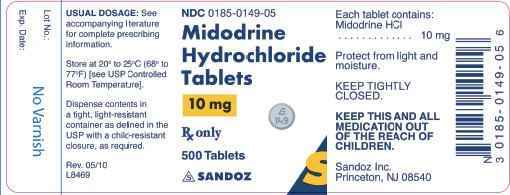Contents
What Is Midodrine?
Midodrine is a prescription medication that constricts blood vessels and increases blood pressure. It is available in 2.5mg, 5mg, or 10mg oral tablets. The typical adult dosage is 10mg, 3 times daily, ideally spaced at least 3 hours apart. This dosage may be amended according to the age and weight of the patient and their specific medical needs. Always take Midodrine as your physician has prescribed it. Midodrine should not be taken before bedtime, as it can lead to supine hypertension. For this reason, it is recommended that the last dosage of Midodrine be taken at least 4 hours before bed.
What Is Midodrine Used For?
Midodrine is most often used to treat severely low blood pressure that results in fainting or dizziness. Severely low blood pressure is a symptom commonly seen in patients with dysautonomia or autonomic dysfunction. This is why Midodrine is frequently used in conjunction with beta-blockers, medications that can control tachycardia – another common symptom of dysautonomia.
Possible Midodrine Side Effects:
- Burning or itching of the scalp
- Chills
- Goosebumps
- Urinary frequency
- Anxiety
- Confusion
- Dry mouth
- Flushing
- Headache
- Feeling of pressure in the head
- Skin rash
- Dry skin
- Backache
- Drowsiness
- Dizziness
- Leg cramps
- Gas
- Heartburn
- Canker sores
- Nausea
- Skin sensitive to touch
- Trouble sleeping
- Weakness
Contact your physician immediately if you experience any of the following rare side effects:
- Fainting
- Blurred vision
- Cardiac awareness
- Headache
- Pounding in the ears
- Increased dizziness
- Slow pulse
Contraindications
Before taking Midodrine, consult with your physician if you have any of the following conditions. Midodrine can produce adverse effects or worsening of any of the following conditions:
- High blood pressure
- Severe heart disease
- Renal disease
- Urinary retention
- Pheochromocytoma
- Thyrotoxicosis
- Diabetes
- Overactive thyroid
- Supine hypertension
- Glaucoma
- Liver disease
The effects of Midodrine on pregnant or breastfeeding women is unknown. Check with your physician before taking Midodrine when pregnant or breastfeeding.
Possible Drug Interactions
Taking Midodrine with any of the following medications can produce adverse effects. Always check with your physician before taking Midodrine with any of the following:
- Metformin
- Cimetidine
- Ranitidine
- Procainamide
- Triamterene
- Flecainide
- Quinidine



